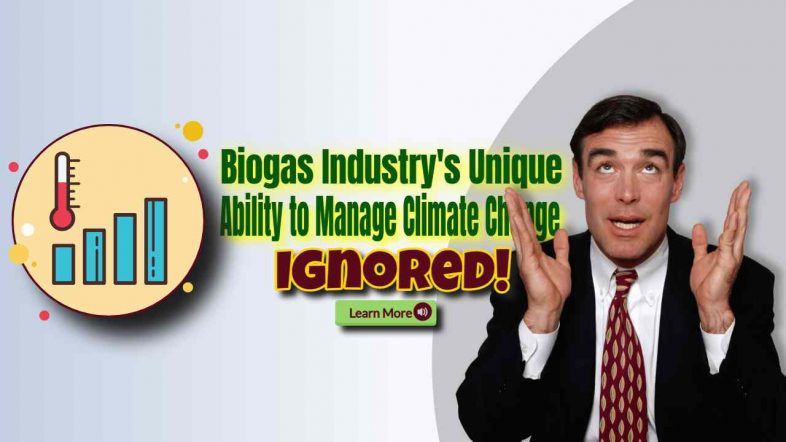Biogas industry spokesman WBA speaks out on the dangerous lack of appreciation of the global biogas industry's unique ability to Manage Climate Change. Anaerobic digestion technology is ready now to reduce GHG emissions but is currently set to be ignored by the world's politicians they say.
The latest IPCC Report urges urgent climate action while a whole industry waits to help meet the challenge.
Are the world's politicians so deluded by:
- Electrification: which needs huge advances in battery technology further development to be viable
- Hydrogen technology: which is even less market-ready than those “toys for the boys” electric cars
- Solar and wind energy: which is only available part of the time, and also depends on so far inadequate storage (battery?) problems,
that they are about to make a disastrous mistake?

Read on and make your own conclusions about the biogas industry's potential:
WBA Press Release (11 August 2021) Starts:
Climate Emergency: Anaerobic digestion dangerously overlooked as immediate mitigation solution, warns global trade body
- The latest IPCC report calls on “strong, rapid and sustained” reductions to greenhouse gas (GHG) emissions, particularly methane, within the next decade to avert a climate catastrophe.
- The World Biogas Association (WBA) urges policymakers to recognise the vital role of anaerobic digestion (AD) – which produces biogas by recycling methane-emitting organic wastes – as an immediate solution to reducing GHG emissions worldwide.
- Clear evidence and recognition from international bodies such as the UN Environment Programme, Climate & Clean Air Coalition and International Energy Agency show that AD is a readily available, low-cost technology that can immediately help tackle climate change.
- Human activity produces 105bn tonnes of organic wastes every year globally. By treating these wastes through AD, as well as producing green gas and other valuable bioproducts, the biogas industry could deliver a reduction of over 10% in global GHG emissions by 2030.
- Biogas and biomethane (an upgraded form of biogas) are substitutes for fossil natural gas and can rapidly decarbonise carbon-intensive sectors such as transport and heat. AD technology also plays a vital role in decarbonising agriculture – which by itself generates nearly 20% of global GHG emissions.
As the Inter-Governmental Panel on Climate Change (IPCC) publishes an alarming sixth assessment report on climate change, the World Biogas Association (WBA) has renewed its call for the potential of the biogas industry to be urgently unlocked so that it can help deliver the “rapid reductions in GHG emissions and in particular methane” that the IPCC says is needed to address the climate emergency.
The warning amplifies recommendations by the UN Environment Programme (UNEP) and Climate & Clean Air Coalition (CCAC) that said that tackling methane emissions was the most immediate and cost-effective way to avert climate catastrophe.
They identified AD as a readily available low-cost technology that can help reduce these emissions. The International Energy Agency (IEA) has also recognised the value of biomethane in decarbonising the energy sector, whilst the EU has embraced it in its Methane Strategy.
“Research from the WBA and other biogas trade bodies1, as well as UNEP, CCAC and the IEA, has demonstrated our industry's potential to deliver a huge reduction in global GHG emissions, especially methane, within the next few years”, says Charlotte Morton, WBA Chief Executive. “Crucially, anaerobic digestion, the technology that produces biogas – also known as renewable natural gas or biomethane – as well as a biofertiliser, bioCO2 and other valuable bio-products, is ready to deliver on that potential now2. What is badly missing is the political will to remove policy barriers to the growth of the sector – both at global and national levels.
“As the UK prepares to host a particularly critical COP26 and given the widely recognised opportunity to address methane emissions through AD, the British government MUST show the leadership required in speedily committing to an integrated strategy that will deliver the full potential of AD in the UK by 2030 and in ensuring that all other countries follow suit. Without AD fully deployed, it will simply be impossible to keep below 1.5 degrees by 2030, nor to achieve Net Zero by 2050 “,
she continues.
“Such commitments need to be in each country’s Nationally Determined Contributions (NDCs) to the Paris Agreement – almost all of which are still failing to deliver on the targets set in 2015.
“With its latest report, the IPCC has just issued its starkest warning yet of the danger of climate change and of the need to act urgently. We are today issuing our own warning to world governments that it is dangerous to overlook the recognised power of AD as an immediate solution. With the right policy framework in place, AD can cut emissions by 10% by 2030. The global biogas industry has already made a public commitment to play its role to deliver on this potential3. Now it is down to the world's politicians. We're here, we're ready – we're waiting for YOUR commitment, and the world needs it NOW.“
Footnotes – Industry Research:
Biogas Industry's WBA Reports – 1*
The Global Potential of Biogas (2019)
Biogas: Pathways to 2030 (2021)
European Biogas Association (EBA) – 2*
Biogas and Biomethane Success Stories (2020)
Anaerobic Digestion and Bioresources Association (UK)
Biomethane: the pathway to 2030 (2019)
Biomethane: fuelling a transport revolution (2021)
Biomethane and hydrogen: two green gases, one future (2021)
WBA Press Release Ends
6 Methane Based Reasons which Make the Biogas Industry's Case
• AD is a process that converts society's organic wastes into valuable bioproducts such as biogas (a green gas that can be converted to biomethane), digestate (a biofertiliser that can replace fossil-based counterparts), and bio-CO2. It serves as a waste management technique as well as a bioproducts producer, reducing methane emissions at both the upstream and downstream stages of the process.
• Biogas purified to biomethane can be directly fed into the existing gas infrastructure, assisting in the decarbonization of the heat sector right away.
• Cities and large municipal authorities throughout the world are already using biomethane-fueled buses, trash collection vehicles, and HGVs to decarbonize their operations. When an HGV is powered by biomethane instead of diesel, GHG emissions are reduced by over 85%.
• Digestate, a biofertiliser produced as a byproduct of AD, aids in the replacement of fossil-based fertilisers in agriculture and the restoration of soils. On-farm AD also aids farmers in producing their own energy to operate their equipment and facilities.
• Biogas is a highly adaptable green gas that, if necessary, may be converted to green hydrogen using current technologies. As a result, it can assist in meeting future energy demands in both the short and long term.
The Future of Sustainable Bio-based Materials and Products
Bio-based materials are products and materials made from renewable biological resources like plants, animals, and microorganisms. They are a sustainable alternative to traditional fossil-fuel-based products, offering advantages such as a smaller carbon footprint and reduced reliance on finite resources. Common examples include timber, hemp, and bio-based plastics like polylactic acid (PLA), and they are used […]
A Success Story: LFG-to-Energy Conversion Units Transforming Landfill Gas in California
California's landfill gas-to-energy conversion units are redefining waste management by transforming captured methane into electricity, renewable natural gas for vehicles, and liquefied natural gas. These advancements mark a significant step towards sustainability, reducing carbon footprints and turning waste into a valuable, clean energy resource…
Best Low Carbon Farming Practices & Techniques
Farmers are turning to low carbon techniques like no-till farming and precision agriculture to combat climate change. These practices not only reduce emissions but also improve soil health and farm profitability, offering a resilient future for agriculture as weather patterns grow increasingly unpredictable…
Which Gas is Produced from Landfill Waste: The Gas that Trash Produces…
Discover which gas is produced from landfill waste and understand its environmental impact and potential energy use. Explore landfill gas management.








